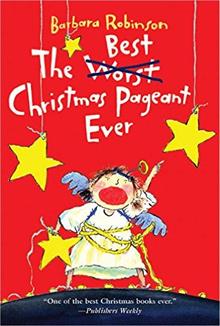 One of the sadder things I've ever done happened last year on the last day of school before winter vacation: I had to retire one of my favorite books, a staple of my annual read-alouds, The Best Christmas Pageant Ever by Barbara Robinson.
One of the sadder things I've ever done happened last year on the last day of school before winter vacation: I had to retire one of my favorite books, a staple of my annual read-alouds, The Best Christmas Pageant Ever by Barbara Robinson.
I did not retire the book because of its Christmas/Christian backdrop. Or its savvy rendition of the birth of Christ. When Robinson wrote the book in 1973, society called it “Christmas Vacation,” while today, we have a winter break. Some 40 years after publication, the book seems more appropriate for Sunday school classes than a public school classroom, but that isn’t my problem.
To me, this content is no different than some of the religious aspects that appear in Beyond Lucky, Buddha Stories, or Martin de Porres. If anything, these books allow children to explore different cultures and belief systems, an important component to foster understanding amongst our universal brotherhood.
Actually, the issues are in the non-religious content.
Imogene smokes cigars—this is a big deal. Remember the days when kids stood out by the loading docks or on the corner of school property to smoke, some as young as age 12? I'm sure in 1973 a girl from a broken home (likely not a term used then) might actually smoke publicly, cigars or not. Today, smoking is taboo. Period.
What agenda did Robinson have behind that portrayal of Imogene? A discussion could help the reader define the context of time and the embodiment of the character. What were the implications behind Imogene’s smoking? Today’s schema likely alters the comprehension Robinson had foreseen. By teaching the book, I run the risk of introducing students to risky behavior.
My favorite part of the book is between chapters 5 and 6, when the Herdmans throw a fit about the gifts Jesus received, claiming they received better gifts from the fireman (or child welfare, if you've seen the movie). This event was a prelude to the annual writing assignment in class on favorite Christmas/Holiday/winter memoir.
I started by showing frankincense to students; it’s not only a new word to students but also an idea the readers can rarely visualize. Frankincense is the resin burned to “be in the presence of God.” I told the students my story of fogging the church with frankincense during midnight mass in 1991. Right in the middle of mass, the church had to be evacuated because I did not pay attention to the gap in the burner that “fueled” the coals, and the intense smoke set off fire alarms.
This is an indirect, far more innocent, connection to Imogene smoking in the girl’s room. Her smoking inadvertently foiled the Ladies Aid pageant preparations, “causing” their applesauce cake to burn up, setting off the fire alarms in chapter 6.
Speaking of Imogene, what about her sneaking a peek at health records? That has illegal invasion of privacy written all over it. What might have occurred as an inappropriate joke (and bullying) in her day now has serious employment, privacy, and legal implications. Although still funny in the book, I had to question what message I was sending to student in today’s privacy-protected culture.
There are also a number of sensitivity issues. Material like this doesn’t fly in schools with restorative practices or Positive Behavioral Interventions and Supports. The Herdman’s comments towards children like, “Your dad's in jail,” and the child welfare issues like dad jumping the train and mom working two shifts at the shoe factory just to avoid their kids—how often do we see/hear this kind of material in reading today? The heresy! Then there is letting a child sleep in the bureau drawer….
Such lines, intended to be funny, are likely to incite “questionable content” complaints these days. I had to retire the book.
Suddenly, under the definitions of text complexity, this book is now hard! When readers cannot see the humor or the theme buried within the story, the book becomes boring. I can teach strategies to read the book, but I cannot give them the background I have, or maybe you have, to enjoy the book. I (we) grew up in different time. I loved being a shepherd or Joseph in Christmas pageants. It was a part of my life—a long time ago.
Yet, in all, the Herdmans are the heroes of the story. They are the ones that change the most. Their story defines modern day redemption to some extent. As readers we cannot help but to forgive the Herdmans for their behavior, even under the context of Christmas, a time of renewal. Robinson teaches us not just the meaning of Christmas but the meaning of life: to find love by looking into the eyes of the poor. I mean, really. How can one not wonder what the Herdmans were really thinking when they gave their Christmas ham as a gift? Or Imogene desiring to be special, innocent, and pure? Her portrayal of Mary simply served as a vehicle to reveal the true heart and character Imogene possessed. Is this not the innocence we want for everyone?
I wonder if I am sheltering my students. Should I bring The Best Christmas Pageant Ever out of retirement?
Justin Stygles is a sixth-grade teacher and literacy specialist in Western Maine. He has taught at a variety of levels for 12 years and is currently working with Corwin Literacy about effect, emotions, and transactional reading.